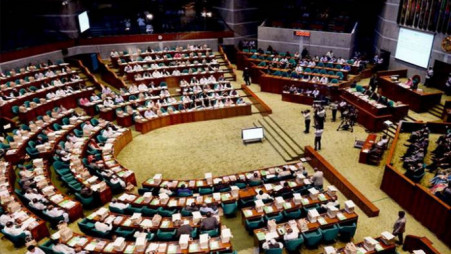Explainer: Why CPD calls for scrapping Upper House plan?
The think tank observed that the move will not bring any effective change but rather add further complexity to Bangladesh's parliamentary system

The Centre for Policy Dialogue (CPD) today (9 October) recommended scrapping the proposed plan to introduce an Upper House in the next (13th) national parliament.
The think tank observed that the move will not bring any effective change but rather add further complexity to Bangladesh's parliamentary system.
Bangladesh not ready for a second chamber
In a study titled "Ensuring Accountability of the Majority Party in the Parliamentary System of Bangladesh", the CPD stated that the Constitution Reform Commission recommended a bicameral parliament, which political parties also endorsed. However, historical and structural realities suggest Bangladesh is not ready for a second chamber.
It noted that Bangladesh's unitary structure and cultural-linguistic homogeneity reduce the natural need for a second chamber.
The CPD study cited the reform commission's proposal of a 105-member upper house: 100 elected proportionally by parties in the lower house and 5 nominated by the President to represent disadvantaged communities.
According to the study, the proposals are influenced by countries with long-standing bicameral traditions, such as the UK and USA. The UK benefits from conventions and limited upper-house powers, while the US Senate suffers from overrepresentation and inefficiencies.
It said reform agendas in Bangladesh often follow a "Wishlist" approach rather than long-term structural planning.
Representation issues
The CDP study noted that in practice, upper house's aim is to primarily represent political parties rather than marginalised groups. Dominance of white-collar elites within parties makes voluntary inclusion of marginalised communities unlikely without specific rules.
"The 1% vote threshold for representation poses challenges for fringe parties. Historical elections show dominance by a few parties – Awami League, BNP, Jatiyo Party and Jamaat-e-Islami. Other parties rarely crossed the 1% threshold, limiting their ability to gain upper-house representation," said the CPD.
It warned that this pattern highlights potential underrepresentation of smaller or marginalised political actors in a proportional upper house.
Pervasive dominance of responsiveness to power interests
The CPD study mentioned that political contests in Bangladesh are unlikely to change, reflecting the enduring dominance of responsiveness to power interests.
"New parties, except those patronized by the state, struggle to establish secure electoral support. Established parties are likely to retain dominance, although the form of control may evolve," it said.
According to the study, without constituency-based accountability, upper house members are likely to serve party interests or act on behalf of domestic or international agencies.
Selecting non-partisans for the Upper House
The Election Reform Commission recommended that half of a party's upper house seats be filled by non-partisan representatives from civil society, academia, science, humanitarian work, labor, women's rights, culture, and marginalised communities.
It also proposed that 30% of upper house members be women, aiming to enhance responsiveness to diverse and majority interests.
However, the Constitutional Reform Commission did not suggest any reservation for women.
"If implemented, non-partisan seats could depoliticise the upper house but may make politicians vulnerable to influence from so-called non-partisans," said the CPD study.
Financial implication of bicameralism
The study noted that bicameral systems generally incur higher costs due to salaries, staff, infrastructure, and operations for two legislative bodies.
It stated that countries like India, Nepal, and Pakistan face significant financial commitments. India's Parliament costs over $537 million PPP for both chambers and ratio of budget for both chambers is 65:35.
According to the study, smaller bicameral systems, like Bhutan, cost around $9.5 million PPP and ratio of budget for both chambers is 58:42.
The CPD noted that bicameralism also increases administrative overhead but provides a review mechanism to enhance law-making quality.
It said unicameral systems, such as Bangladesh and Iran, operate with lower budgets and simpler administrative structures.



 Keep updated, follow The Business Standard's Google news channel
Keep updated, follow The Business Standard's Google news channel


















